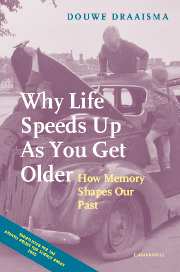Book contents
- Frontmatter
- Contents
- List of illustrations
- Acknowledgments
- 1 ‘Memory is like a dog that lies down where it pleases’
- 2 Flashes in the dark: first memories
- 3 Smell and memory
- 4 Yesterday's record
- 5 The inner flashbulb
- 6 ‘Why do we remember forwards and not backwards?’
- 7 The absolute memories of Funes and Sherashevsky
- 8 The advantages of a defect: the savant syndrome
- 9 The memory of a grandmaster: a conversation with Ton Sijbrands
- 10 Trauma and memory: the Demjanjuk case
- 11 Richard and Anna Wagner: forty-five years of married life
- 12 ‘In oval mirrors we drive around’: on experiencing a sense of déjà vu
- 13 Reminiscences
- 14 Why life speeds up as you get older
- 15 Forgetting
- 16 ‘I saw my life flash before me’
- 17 From memory – Portrait with Still Life
- Index of names
9 - The memory of a grandmaster: a conversation with Ton Sijbrands
Published online by Cambridge University Press: 22 September 2009
- Frontmatter
- Contents
- List of illustrations
- Acknowledgments
- 1 ‘Memory is like a dog that lies down where it pleases’
- 2 Flashes in the dark: first memories
- 3 Smell and memory
- 4 Yesterday's record
- 5 The inner flashbulb
- 6 ‘Why do we remember forwards and not backwards?’
- 7 The absolute memories of Funes and Sherashevsky
- 8 The advantages of a defect: the savant syndrome
- 9 The memory of a grandmaster: a conversation with Ton Sijbrands
- 10 Trauma and memory: the Demjanjuk case
- 11 Richard and Anna Wagner: forty-five years of married life
- 12 ‘In oval mirrors we drive around’: on experiencing a sense of déjà vu
- 13 Reminiscences
- 14 Why life speeds up as you get older
- 15 Forgetting
- 16 ‘I saw my life flash before me’
- 17 From memory – Portrait with Still Life
- Index of names
Summary
At 9.30 in the morning of 6 November 1999, Ton Sijbrands was sitting in the boardroom of an insurance company in Gouda in the Netherlands. On the table in front of him lay a box of Dannemann cigars, and next to it a sheet of paper with the names of twenty opponents. In another large room in a different part of the building each of these was sitting behind his own board: six first-class and fourteen strong players, for the most part members of the Gouda Damlust draughts society, ranked in the national first division. Sijbrands had just shaken each one by the hand and wished them an enjoyable game. At 9.40, he used a permanently open telephone line to send his opening move on board 1: 32-28. Precisely fifteen hours later, at 12.40 a.m., the last opponent resigned. Sijbrands had won seventeen games and conceded three draws. None of his opponents ever had a serious chance of winning.
Sijbrands, the former world champion, enhanced his own record with this score of 92.5 per cent wins. He had played his first official simultaneous blindfold game in 1982 at The Hague, with a new world record of eight out of ten. He has never surrendered his title since then. The Gouda simultaneous blindfold was an improvement of 100 per cent on his first title.
In that last simultaneous game, 1,708 moves were made. Every move is a choice out of a multiplicity of options that have to be evaluated.
- Type
- Chapter
- Information
- Why Life Speeds Up As You Get OlderHow Memory Shapes our Past, pp. 98 - 106Publisher: Cambridge University PressPrint publication year: 2004

